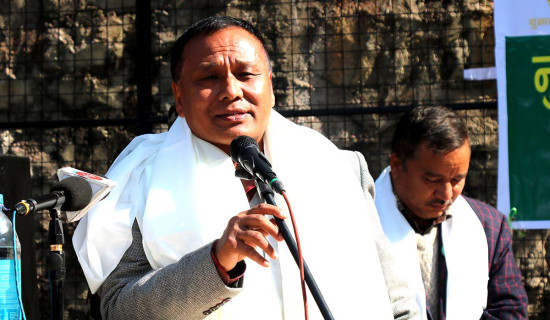- Saturday, 27 December 2025
Threat Of M-pox Outbreak
Bini Dahal
As the world is still not completely free from remnants of Coronavirus and its different variations, monkeyvirus has now established itself as a continental virus in Africa. Termed as mpox, the virus has been declared a public health emergency. According to the news report, more than 14,000 cases have occurred since the beginning of the year. And 511 people have lost their lives. The virus apparently began spreading from the Democratic Republic of Congo and has reached other African countries like Burundi, the Central African Republic (CAR), Kenya and Rwanda. Its symptoms include fever, muscle aches and lesions in the skin.
The virus is said to spread from animals to humans and among people through close contact with infected people. Called a very dangerous strain, the virus can also spread through sexual contacts. In Africa, mpox is said to be more prevalent among women and children. The Africa Centre for Diseases Control and Prevention (Africa CDC) has said that in Congo nearly 70 per cent of the cases are seen in children under the age of 15. This figure alone accounts for 85 per cent of deaths in the country.
At the moment, the African region has only 200,000 doses available for the virus. And countries are in need of at least 10 million vaccines. This shortage of vaccines can further propel the aggravation of the virus. It's not like monkey virus emerged suddenly now. Before too, we had learnt of the virus cases. But scientists highlight the virus to be changing its state and becoming more and more complicated. In the globalised world, it is quite difficult to put a complete stop on the transmission of viruses from one region to another. Therefore, it is key to control the mass spreading at the point of origin itself.
The World Health Organisation (WHO) just recently declared it a global emergency after going through the process of bringing about an expert group to see if the spread of the virus in Africa requires it to be declared a global emergency. Most people in the African region are not much aware of the virus and it is even more so in the rural areas. Plus the virus apparently has even been asymptomatic for some of the people. It has been estimated that this scenario is in the case of 10 per cent of the infected population. So, the situation is much more dangerous than imagined. With passing times, public health has become a complex and a challenging sector. The emergence of new deadly diseases and viruses have posed a problem for the global citizens.
Amidst such a situation, it is key for countries and international organisations to invest more in this sector. The investment should focus more on research and development, ensuring adequate supply of vaccines and other medicines and on creating mass awareness. Speedy and timely efforts on prevention and control should be the key focus. Because the public health sector in general is pretty weak in developing countries, it is imperative that developed countries provided necessary financial and technical assistance to them. For the remaining parts of the world, countries like ours must prepare themselves with necessary medical equipment and support to better tackle the problem – if it ever arrives.

















